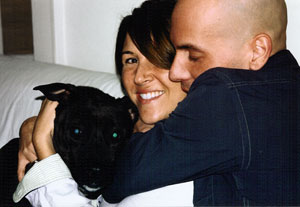ANIMAL RESCUE FUND: Couple May Sue Over Dog's Death, 'No-kill' shelter failed to warn that it might have to take drastic step

When Sharon and Todd Kopetic relinquished Mocha, a chocolate and black Labrador mix, to the Animal Rescue Fund of the Hamptons in June, they never imagined it would mean a death sentence. The Kopetics had been promised that if the dog was not adopted she would spend the rest of her days at the shelter.
Mocha was killed within hours of their departure.
ARF, a privately funded adoption center and shelter in Wainscott, describes itself as a "no-kill" facility. "We were shocked and devastated to learn of Mocha's fate," Ms. Kopetic said. "And the worst part is, her life didn't have to end that way."
The Kopetics, who live in Glen Cove, have retained the services of Leeds, Morelli and Brown, a law firm in Nassau County. "We are looking at the case with a view toward commencing legal action," Lenard Leeds confirmed this week.
"We stand by our decision," said Sara Davison, ARF's executive director. "The dog was deemed dangerous after she lunged at the face of a veterinary technician during a behavioral test."
"As a responsible agency, we can't place animals that are deemed dangerous back into the community," she said. Ms. Davison did concede that "mistakes were made" in the four months preceding the dog's death.
The Kopetics adopted Mocha from ARF two years ago when she was 10 months old and they were living in East Hampton. During the adoption process, Moira Chowdhury, an ARF adoption coordinator, informed them that the dog had had an abusive upbringing and that she did not do well with men.
The couple brought Mocha home, enrolled her in an ARF obedience course, and worked with a private trainer. Her behavior improved considerably. "Other than on our first night, when Mocha snapped at Todd's face, we never had any problems with her," said Ms. Kopetic. "She certainly never bit anyone."
The Kopetics, who are expecting their first child in September, brought Mocha back to ARF on June 29. They said the decision was "extremely difficult" to make, but that, in light of the dog's protectiveness with Ms. Kopetic and anxiousness around children, they were concerned about how she would behave around a newborn.
"We sent out an e-mail to family and friends seeking a loving home for Mocha," said Ms. Kopetic. Their private e-mail made its way to ARF and Ms. Chowdhury contacted the couple.
"Moira told us we were contractually obligated to return Mocha to the shelter instead of trying to find a home for her ourselves," said Mr. Kopetic. Paperwork the couple signed at the time of the adoption stipulated that they needed ARF's approval before giving their adopted pet to anyone else, but not that the adopted animal would necessarily have to be returned to ARF.
"Moira told us ARF was the best place for her," said Ms. Kopetic. "When we dropped her off, she assured us Mocha would not be killed and that ARF was a 'no-kill' facility."
The Kopetics said they had misgivings and called ARF within 48 hours after returning Mocha to the shelter. Mr. Kopetic was told there had been a problem and that the dog was dead.
Based on Mocha's history and what they observed at the shelter, Ms. Davison said, destroying the animal was the only course to take.
The agency will not destroy an animal unless it is incurably ill or has severe behavioral problems such that it is a danger to the community, Ms. Davison said. "We go to extreme lengths to rehabilitate animals and have kept many who were not immediately adopted at our facility for years."
But shortly after being dropped off, Mocha failed two behavioral tests. She was put down after attempting to bite two ARF staff members.
Mr. Kopetic met twice with ARF executives following Mocha's death, and each time Ms. Davison "apologized profoundly" for not having been up-front about the possibility that the animal might be killed. Ms. Davison said the agency's seven-member shelter committee made the decision to withhold that information when they dropped off the dog based on Ms. Kopetic's pregnancy.
"It was a terrible mistake and in hindsight we should have told them," Ms. Davison said.
The Kopetics maintain that the definition of "no-kill" needs to be made clear to pet owners who leave their animals at the shelter. When the couple asked for clarification about the term after Mocha's death, Ms. Davison referred them to Maddie's Fund, a leading "no-kill" advocacy group.
"No-kill" as defined on its Web site as "saving both healthy and treatable dogs and cats, with euthanasia reserved only for non-rehabilitable animals."
As a result, ARF has "rethought several policies," including how animals with behavior problems will be evaluated in the future, Ms. Davison said. "A mandatory five-day holding period has been instituted, at which point an animal will undergo a behavior test to determine its adoptability."
"These tests are a crock," said Dr. Peter Borchelt, a certified applied animal behaviorist with 30 years in the field. "What happened with Mocha is a tragedy, but only scratches the surface of a much larger animal welfare issue."
According to Dr. Borchelt there is no such thing as a standardized behavioral test on which life-and-death decisions can securely be made.
During the first six months of 2005, ARF placed 159 animals in homes and destroyed four, two for incurable illnesses and two, including Mocha, for behavioral reasons. In 2004, the agency placed 440 animals and destroyed five, four with incurable illnesses and one for reasons of behavior.
The decision to destroy an animal "is agonizing for us to make," said Ms. Davison. "It only happens in unusual cases after very careful consideration."
